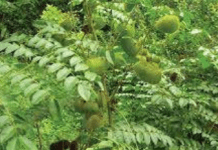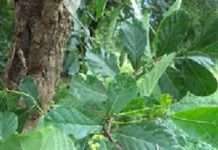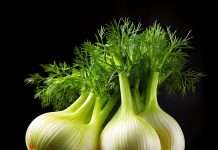
There are two sources of glucose/sugar in the body: endogenous and exogenous sources. Endogenous source means internally-generated sugar, through biochemical processes called gluconeogenesis, which collectively means synthesis of new glucose. Endogenous means external source through diets. Glucose /sugar is required to be broken down in cascades of metabolic processes to provide nourishment and energy for the body. The intervention, interruption, or modulation of these processes may result in deleterious effects.
Generally, diabetes elicits its deleterious effects on the human body in multiples ways including these major points discussed below: suppression of glucose transportation into the cells and tissues for nourishment and energy provision; damage of the beta cells of the pancreas; suppression of antioxidant protection system; and the acceleration of gluconeogenesis (endogenous or internal glucose production).
- Bitter leaf inhibits / suppresses endogenous glucose production (gluconeogenesis). Treatment of diabetic laboratory animals for seven and 14 days, with 200 and 400 mg/kg of body weight with bitter leaf extracts or Metformin (500 mg/kg of body weight) resulted in a striking decrease in the expression of the gluconeogenic enzymes (fructose 1,6 bisphosphate, phosphooenol pyruvate, carboxy kinase, and glucose-6- phosphatase) in the liver and muscle. These genes were found to be highly expressed in the tissues of untreated diabetic animals (Atangwho et al., 2014). This observation is quite significant as the liver is the major site for gluconeogenesis.
- Bitter leaf stimulates glucose transportation. Glucose transportation in the brain is usually suppressed in type 2 diabetes. Erukainuru and Islam (2019) showed that extracts of bitter leaf improved glucose transportation in the brains and muscles of diabetic animals treated with bitter leaf, compared to control. Metformin served as positive control.
- Bitter leaf elicits antioxidant property. Diabetes promotes generation or production of free radicals that cause cellular damage in the body, playing a significant role in the aetiology of many illnesses. Erukainuru and Islam (2019) showed that extracts of bitter leaf promote antioxidant activity by the stimulation/activation of several antioxidant enzymes (reduced glutathione level, superoxide dismutase, and catalase activities, with concomitant depletion of malondialdehyde level.
These investigators concluded that the ability of bitter leaf extracts to stimulate glucose uptake and protect against diabetes-induced changes in the composition of functional groups in the liver gives more credence to its reported antidiabetic property. Thus, bitter leaf can be a local and inexpensive source of nutraceutical for the treatment and management of type 2 diabetes and its complications.
- Bitter leaf is insulinogenic; regeneration of the beta cells of the pancreas. The beta cells of the Pancreas function to produce insulin required for glucose metabolism. In diabetes, insulin secretion is compromised. There is evidence to show now that extracts of bitter leaf may be insulinogenic by the stimulation of cellular regeneration of the beta cells of the pancreas and thus contributing to cellular insulin level (Atangwho et al., 2010).
By Prof. Ernest B. Izevbigie
References
- Atangwho, I.J., Yin, K.B., Umar, M.I, Ahmed, M., and Asmaewi, M.Z. vernonia amygdalina simultaneously suppresses gluconeogenesis and potentiates glucose oxidation via the pentose phosphate pathway in streptozotocin-induced diabetic rats. BMC Complementary Medicine and Therapies 14: 426, 2014
- Erukainure, O.L., Oyebode, O.A., Ubeji, C.U., Koobanally, N.A., and Islam, M.S. The effect of extracts of bitter leaf of vernonia amygdalina on blood glucose. Metabolic Brain Disease 34: 721-732, 2019
- Erukainure. O., and Islam, M.S. Vernonia amygdalina stimulated glucose uptake and modulates redox activities and functional chemistry in oxidative hepatic injury. J Food Biochemistry 46(1): 13, 794, 2019
- Atangwho, I.J., Ebong, P.E., Egbung, E.E., and Obi, A.U. Extract of vernonia amygdalina Del. (African bitter leaf) can reverse pancreatic cellular lesion after alloxan damage in the rat. Australian J. Basic and Applied Sciences 4(5): 711-716, 2010











